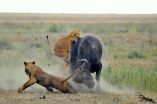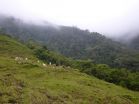Making the easiest judgments first
2015-09-03
(Press-News.org) Evidence from a new study published in PLOS Computational Biology by researchers from Brown University and led by Assistant Professor Thomas Serre suggests that when we analyze scenery we simply make the easiest judgments first, rather than following a priority order of categories.
There are many ways we understand scenery. Is it navigable or obstructed? Natural or man-made? A face or not a face? In previous experiments, researchers have found that some categorization tasks seem special, in that they occur earlier than others, leading to a hypothesis that the brain has a prescribed set of priorities. One example of this, the "superordinate advantage," holds that people will first sort out global properties of a scene or "superordinate" categorization before analyzing more specific properties or "basic" categorization. Judging "indoor vs. outdoor," the hypothesis goes, not only does happen before "kitchen vs. bathroom," but also must happen beforehand.
To check that assumption, Serre and colleagues iterated upon a standard computational model that could reliably rate the "discriminability" of scenery, or how easily images could be categorized. Then they did two experiments with human volunteers. The first showed that the more discriminable scenery was as predicted by the model, the faster and more accurately people categorized it. The second showed that by manipulating discriminability they could completely wipe out the "superordinate advantage." If a more basic categorization was easier, it happened faster than the superordinate categorization.
"The mere fact that it is possible to reverse [the superordinate advantage], shows that it not a sequential type of process," Serre said. "Whatever is happening in the visual system might not be as sophisticated as we thought."
It's certainly still possible that a hybrid of the two hypotheses exist, Serre said. There may be some hierarchy or priorities, but discriminability is so a powerful a factor it can actually overwhelm it. Further experiments are underway.
INFORMATION:
Image Credit: Flickr / Creative Commons
Image Link: https://www.plos.org/wp-content/uploads/2015/09/visual-plos-comp-biol-2.gif
All works published in PLOS Computational Biology are Open Access, which means that all content is immediately and freely available. Use this URL in your coverage to provide readers access to the paper upon publication: http://journals.plos.org/ploscompbiol/article?id=10.1371/journal.pcbi.1004456
Contact: Thomas Serre
Address: Cognitive, Linguistic & Psychological Sciences Department, Brown Institute for Brain Science, Brown University, Providence, Rhode Island, United States of America
Phone: 4018631148
Email: thomas_serre@brown.edu
Citation: Sofer I, Crouzet SM, Serre T (2015) Explaining the Timing of Natural Scene Understanding with a Computational Model of Perceptual Categorization. PLoS Comput Biol 11(9):e1004456. doi:10.1371/journal.pcbi.1004456
Funding: This work was supported by the National Science Foundation (NSF) early career award [grant number IIS-1252951 to TS]. Additional support was provided by the Defense Advanced Research Projects Agency (DARPA) young faculty award [grant number YFA N66001-14-1-4037 to TS], the Office of Naval Research (ONR) grant [grant number N000141110743 to TS], the Brown Institute for Brain Sciences (BIBS), the Center for Vision Research (CVR), and the Center for Computation and Visualization (CCV). The funders had no role in study design, data collection and analysis, decision to publish, or preparation of the manuscript.
Competing Interests: The authors have declared that no competing interests exist.
About PLOS Computational Biology
PLOS Computational Biology features works of exceptional significance that further our understanding of living systems at all scales through the application of computational methods. All works published in PLOS Computational Biology are Open Access. All content is immediately available and subject only to the condition that the original authorship and source are properly attributed. Copyright is retained. For more information follow @PLOSCompBiol on Twitter or contact ploscompbiol@plos.org.
About PLOS
PLOS is a nonprofit publisher and advocacy organization founded to accelerate progress in science and medicine by leading a transformation in research communication. For more information, visit http://www.plos.org.
ELSE PRESS RELEASES FROM THIS DATE:
2015-09-03
Rodents huddle together when it is cold, they separate when it is warm, and at moderate temperatures they cycle between the warm center and the cold edges of the group. In a new study published in PLOS Computational Biology, Jonathan Glancy, Roderich Gross, Jim Stone and Stuart Wilson from the University of Sheffield found they could simulate huddling by assuming simply that touching individuals in turn brings their temperatures closer to an ideal body temperature. According to the model, these selfish individual behaviours improved the ability of the whole group to regulate ...
2015-09-03
Why aren't there more lions? That was what puzzled McGill PhD student Ian Hatton, when he started looking at the proportion of predators to prey across dozens of parks in East and Southern Africa. In this case, the answer had nothing to do with isolated human hunters. The parks were teeming with potentially tasty treats for the lions. So one might imagine that the population of lions in each park would increase to match the available prey. Instead, what Hatton and the McGill-led team discovered was that, in a very systematic way, in crowded settings, prey reproduced less ...
2015-09-03
CAMBRIDGE, Mass. (September 3, 2015) - A protein known to play a role in transporting the molecular contents of normal cells into and out of various intracellular compartments can also turn such cells cancerous by stimulating a key growth-control pathway.
By conducting a large-scale search for regulators of the signaling pathway known as PI3K/AKT, which promotes cell survival, growth, and proliferation--and which is highly active in cancer cells--researchers at Whitehead Institute and Memorial Sloan-Kettering Cancer Center have implicated the protein RAB35 in the oncogenic ...
2015-09-03
For millions of years, the Pacific and North American plates have been sliding past -- and crashing into -- one another. This ongoing conflict creates uplift, the geological phenomenon that formed mountains along the west coast.
A new analysis by UC Santa Barbara earth scientist Alex Simms demonstrates that the Pacific coastlines of North America are not uplifting as rapidly as previously thought. The results appear in the journal Geological Society of America Bulletin.
"Current models overestimate uplift rates by an average of 40 percent," said Simms, an associate ...
2015-09-03
Hurricane Jimena, a once powerful Category 4 storm with maximum sustained winds estimated at 140 mph by the National Hurricane Center, has continued to weaken well east of Hawaii. The Global Precipitation Measurement or GPM core satellite analyzed rainfall rates and saw the eyewall was eroding.
The eyewall of a hurricane contains a storm's most damaging winds and intense rainfall. It consists of a vertical wall of powerful thunderstorms circling a hurricane's open eye.
GPM is a joint mission between NASA and the Japanese space agency JAXA. GPM captured data on Jimena ...
2015-09-03
The world is facing an extinction crisis as more and more forests are converted into farmland. But does it help when farms share the land with birds and other animals?
The short answer is "no," according to new evidence based on the diversity of bird species reported in the Cell Press journal Current Biology on September 3. If the goal is to preserve more bird species, representing a greater span of evolutionary history, then it's better to farm more intensively in some areas while leaving more blocks of land entirely alone. In other words, land-sparing wins out over ...
2015-09-03
High levels of saturated fat in the blood could make an individual more prone to inflammation and tissue damage, a new study suggests.
Received wisdom on the health risks of eating saturated fat has been called into question recently. This new research supports the view that excessive consumption of saturated fat can be bad for us.
Scientists from Imperial College London studied mice that have an unusually high level of saturated fat circulating in their blood. The research, published today (3 September 2015) in Cell Reports shows that the presence of saturated fats ...
2015-09-03
Giving cancer patients aspirin at the same time as immunotherapy could dramatically boost the effectiveness of the treatment, according to new research published in the journal Cell today (Thursday).
Francis Crick Institute researchers, funded by Cancer Research UK, have shown that skin, breast and bowel cancer cells often produce large amounts of prostaglandin E2 (PGE2). This molecule dampens down the immune system's normal response to attack faulty cells, which helps cancer to hide. It is a trick that allows the tumour to thrive and may explain why some immunotherapy ...
2015-09-03
LAWRENCE - Men might want to ditch the pickup lines and polish their punchlines in their quest to attract women, new research at the University of Kansas suggests.
Jeffrey Hall, associate professor of communication studies, found that when two strangers meet, the more times a man tries to be funny and the more a woman laughs at those attempts, the more likely it is for the woman to be interested in dating. However, an even better indicator of romantic connection is if the two are spotted laughing together.
Those findings were among the discoveries Hall made in his search ...
2015-09-03
Coral Gables, Fla. (September 1, 2015) - Cognitive flexibility is the ability to shift our thoughts and adapt our behavior to the changing environment. In other words, it's one's ability to disengage from a previous task and respond effectively to a new one. It's a faculty that most of us take for granted, yet an essential skill to navigate life.
In a new paper published in the journal Trends in Neurosciences, University of Miami (UM) College of Arts & Sciences researchers clarify many of the concepts surrounding cognitive flexibility and propose a model of its underlying ...
LAST 30 PRESS RELEASES:
[Press-News.org] Making the easiest judgments first



